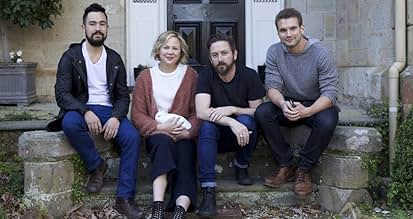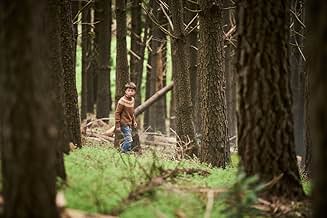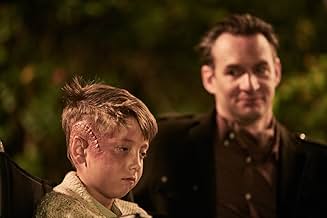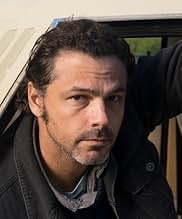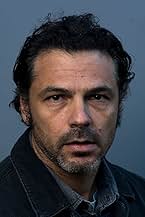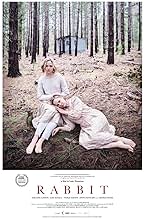After a vivid dream, Maude Ashton returns to Adelaide, certain she now knows the whereabouts of her missing twin sister.After a vivid dream, Maude Ashton returns to Adelaide, certain she now knows the whereabouts of her missing twin sister.After a vivid dream, Maude Ashton returns to Adelaide, certain she now knows the whereabouts of her missing twin sister.
- Director
- Writer
- All cast & crew
- Production, box office & more at IMDbPro
Featured reviews
Acting was fun. Music was intense. Story was chaotic. Enjoyed it. Probably one of the weirdest films I've seen for a while. Had an awkward but engaging vibe with good cinematography and fragments of dreams and nightmares and other things going left right and centre. Real Australian vastness to it.
This sounded like a very promising movie and a interesting delve into the twin connection. However, in my opinion that is not what we got. It's a very slow moving film and lacks in a storyline that keeps you engaged. There is an over use of loud music to try and shock you which doesn't work. The cinematography is nice and pretty......but I wouldn't recommend watching if you are wanting a compelling thriller.
Rabbit could have and should have been a really good thriller come may be, horror story. But pacing, narrative and inconsistent character development mitigate against that possibility ever occurring.
The movie is held together by a compelling central performance from Adelaide Clemens playing identical twins Maude and Cleo. The rest of the cast is very good too, but Clemens shines. It's notable that the film begins to drag more in the second half, when curiously, the focus shifts away for some time, from her character(s).
The cinematography, highlighting locations around south eastern South Australia, not often seen in Australian films, is also first class.
The music mirrors the storyline, in its unevenness. Appropriately foreboding much of the time, but strangely whimsical at odd moments.
My main issues with the film lie in the narrative. Why in the production notes/plot summary immediately reveal the existence of "the Council"? Surely that story point, derivative though it may be, needed to be held back to build, rather than erode suspense. What exactly was the German connection to The Council? Surely this needed more illumination. Australian Maude returns from some time studying overseas in Germany to search for her twin. The Council clearly has some sort of German heritage which is demonstrated frequently in the film's second half ... but so what? We're never given any more information.
The character of Henry the ex(?) detective is never given any real back story, though he features quite heavily in the film's first half. Why is he so obsessed with the case of missing Cleo? He says he is. But crucially the audience is never given any real reasons/evidence for him just joining Maude on her quest at the expense of every thing else. Similarly, in the film's second half, why does so much of the action start to focus on the character of Nerida, when she is just about unseen in the first half. Yes, she is German, involved with the Council and may have had a twin herself, but again, so what? It's almost like director Luke Shanahan, felt he had to give greater prominence to experienced Belgian actress Veerle Baetens, who is undeniably good in the role.
The film's conclusion when it finally arrives, heralds one of those "is that all there is?" occasions, as the final frames mirror those of the movie's opening.
The film's producers were obviously hoping to recreate a rurally-derived Rosemary's Baby type scenario, under the Southern Cross. They only succeeded in creating a rather muted, ambiguously defined off-shoot.
The movie is held together by a compelling central performance from Adelaide Clemens playing identical twins Maude and Cleo. The rest of the cast is very good too, but Clemens shines. It's notable that the film begins to drag more in the second half, when curiously, the focus shifts away for some time, from her character(s).
The cinematography, highlighting locations around south eastern South Australia, not often seen in Australian films, is also first class.
The music mirrors the storyline, in its unevenness. Appropriately foreboding much of the time, but strangely whimsical at odd moments.
My main issues with the film lie in the narrative. Why in the production notes/plot summary immediately reveal the existence of "the Council"? Surely that story point, derivative though it may be, needed to be held back to build, rather than erode suspense. What exactly was the German connection to The Council? Surely this needed more illumination. Australian Maude returns from some time studying overseas in Germany to search for her twin. The Council clearly has some sort of German heritage which is demonstrated frequently in the film's second half ... but so what? We're never given any more information.
The character of Henry the ex(?) detective is never given any real back story, though he features quite heavily in the film's first half. Why is he so obsessed with the case of missing Cleo? He says he is. But crucially the audience is never given any real reasons/evidence for him just joining Maude on her quest at the expense of every thing else. Similarly, in the film's second half, why does so much of the action start to focus on the character of Nerida, when she is just about unseen in the first half. Yes, she is German, involved with the Council and may have had a twin herself, but again, so what? It's almost like director Luke Shanahan, felt he had to give greater prominence to experienced Belgian actress Veerle Baetens, who is undeniably good in the role.
The film's conclusion when it finally arrives, heralds one of those "is that all there is?" occasions, as the final frames mirror those of the movie's opening.
The film's producers were obviously hoping to recreate a rurally-derived Rosemary's Baby type scenario, under the Southern Cross. They only succeeded in creating a rather muted, ambiguously defined off-shoot.
So let me first start off by saying I did enjoy the movie for the most part. The ending sucked because I felt like we had not gotten any real answers to any questions we had, if not it just added more to the pile. The atmosphere was creepy, there was definitely a deep mystery involved, and there was decent shots with interesting locations. But I'm so frustrated I never really got to fully understand the story. There's was definitely alot of things the directors should've filled in as far as gaps go because it just felt incomplete. I'm not sure if they were just trying to be mysterious and whatnot or couldn't figure out a decent ending but it literally made no sense. It's a decent movie but you will be frustrated. And if your sensitive to children getting hurt (which I am) your not going to like this movie. There's alot of experiments and surgeries going on with children and young adults, most of which aren't seen but the after effects are and its hard to watch.
Honestly, it's a well-made movie. Acting is great, cinematography is great, even the directing is great. The issue is this a 1h 40m movie with about 40 minutes of ideas if that. If this was a short film, it would work perfectly... but it's not. It's a full-length film. And that means it has to stretch this otherwise good idea until it far overstays its welcome.
Did you know
- TriviaThe World Premiere was held at the 66th Melbourne International Film Festival on 5th August 2017.
- ConnectionsFeatured in The Story of Rabbit (2018)
- How long is Rabbit?Powered by Alexa
Details
- Release date
- Country of origin
- Official sites
- Language
- Also known as
- Кролик
- Filming locations
- Production companies
- See more company credits at IMDbPro
Box office
- Budget
- A$3,000,000 (estimated)
- Runtime1 hour 43 minutes
- Color
- Aspect ratio
- 2.35 : 1
Contribute to this page
Suggest an edit or add missing content



